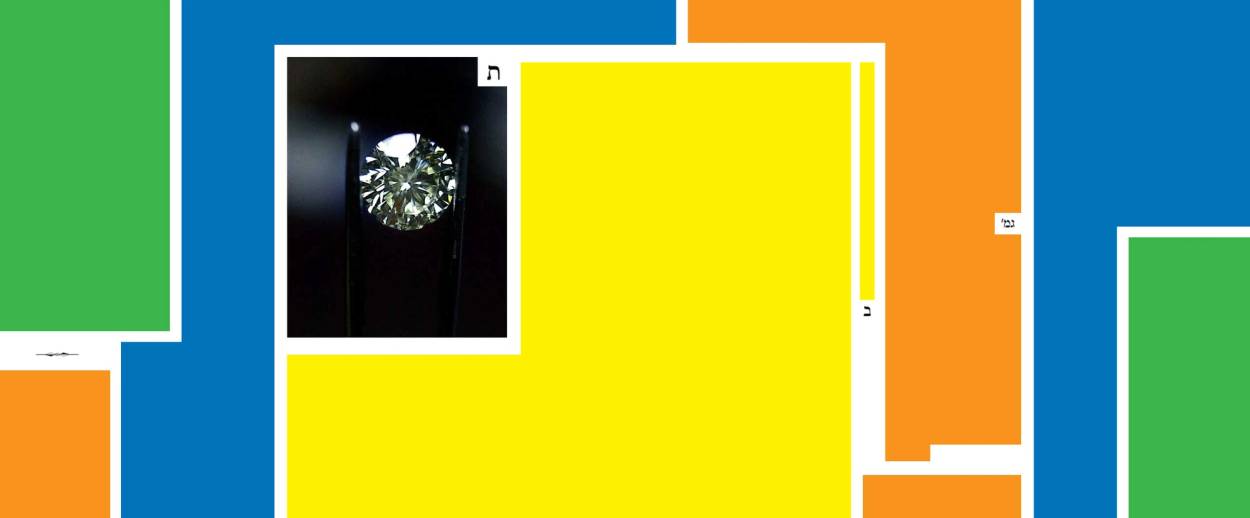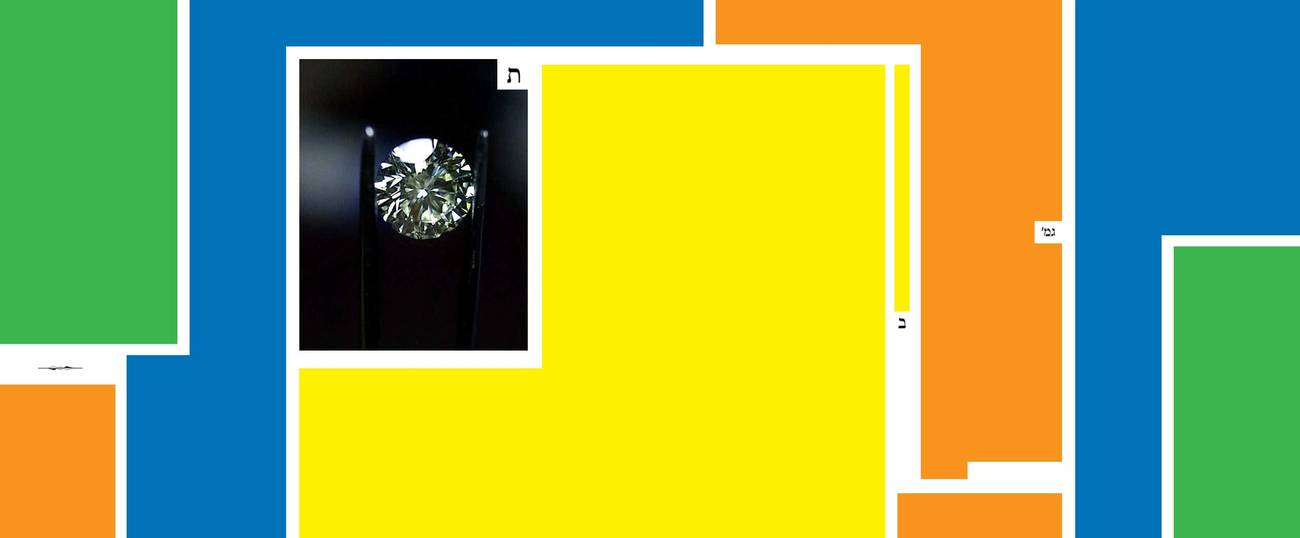Need a Reason to Hope This Campaign Season? Try the Timeless Talmud.
Can it get any worse? Yes, yes, it can, a lot worse, but the continuity of learning in the ‘Daf Yomi’ cycle has remained unbroken.




Literary critic Adam Kirsch is reading a page of Talmud a day, along with Jews around the world.
Reading the Talmud over the past week, in the final days of the presidential campaign, has been a strange experience of cognitive dissonance. I can’t escape the feeling that the political future of American Jewry is at stake in today’s election as never before in my lifetime. That is because the Trump campaign has injected an anti-Semitic poison into American politics that I hoped I would never encounter outside of history books. In a deep sense, the very premise of American Judaism—that it is possible to be fully American and fully Jewish at the same time—is being tested. Is this really a time for poring over 1,500-year-old rabbinic debates about the laws of trusteeship?
But then, perhaps this bad time is exactly the right time for Talmud. The Talmud cannot teach us how to resist our enemies—that requires a different kind of knowledge and skill. But there is something reassuring about the very remoteness of the rabbis from contemporary politics, and from politics in general. It has been nearly 2,000 years since Yehuda HaNasi compiled the Mishna, and in that time the Jewish people have been through much worse ordeals than the ones we are facing in America today. Yet the links in the chain of study have never been entirely broken. Judaism has passed through many places and forms, and there is no reason to think that the American phase of the Jewish story will last forever. But the Talmud does last, and by reading it I have the sense of participating in something, if not timeless, then as close to it as human beings can get.
Chapter Three of Tractate Bava Metzia, which Daf Yomi readers finished this week, continues the exposition of Jewish law relating to property disputes. The first two chapters of the tractate dealt with disputes over lost and found property, such as garments, money, or livestock. The third focuses on another kind of dispute, between the owner of a piece of property and the person to whom he has temporarily entrusted it. That person, known as a “bailee,” is obligated under biblical law to return the deposit to its owner upon demand. In an agricultural society without a banking or credit system, this kind of deposit would have been very common and very important. Any time a man had to travel, for instance, he would have to entrust his money to a bailee. If his property took the form of livestock, he would have needed a bailee to feed and care for it in his absence.
But what happens if the property is stolen while in the bailee’s possession? More generally, what standard of care is he obligated to follow in safeguarding the deposit? The biblical rule laid down in Exodus 22 is that if an item is stolen while in the possession of a bailee, he must swear an oath that he no longer has it and did not misappropriate it. If he swears this oath, he does not have to repay the owner for the value of the deposit. But what happens, the Mishna asks in Bava Metzia 33b, if the bailee prefers not to swear this oath and instead agrees to pay the owner the value of the stolen property, and then the thief is caught and the stolen property is recovered? Does the recovered item belong to the original owner, or did the bailee’s payment effectively transfer ownership of the item to him? According to the Mishna, the bailee is entitled to recover the item; what’s more, he is entitled to receive the double payment that is prescribed by law as punishment for theft.
The Gemara goes on to probe this ruling. If a bailee is entitled to receive the double payment, he is effectively making a profit from the item that was deposited with him. But Rabbi Zeira points out that, in general, a bailee is not legally entitled to profits from a deposit: For instance, “the fleece and offspring” of a sheep in a bailee’s custody belong to the original owner, not the bailee. Why should things be different when it comes to the fine for theft? The Gemara argues that the difference has to do with probability. The owner of the sheep anticipates that it will produce fleece and offspring, but he doesn’t anticipate that it will be stolen, and thus indirectly “produce” profit in the form of the double payment for theft.
Just because a bailee is not held liable for the theft of a deposit in his care doesn’t mean that he has no responsibilities toward it. In Bava Metzia 35a, the Gemara speaks of “a certain man [who] deposited jewels with another,” but when he came to ask for the jewels back, the bailee said, “I do not know where I placed them.” Rav Nachman ruled that this constituted negligence, a clear breach of the bailee’s duty, and so he was obligated to repay the value of the jewels. When he refused to do so, the court ordered his house to be sold to raise the money. At this juncture, however, the jewels were recovered, so Nachman ruled that the house should be returned to the bailee and the jewels should go to the original owner.
Rava observes that this does not appear to be consistent with the rule governing stolen property. If the jewels had been stolen and the bailee had paid the owner for them, then when they were recovered they should have become his property. In this case, we learn, the jewels had appreciated in value since they were lost, and so the bailee would actually end up making a profit. Shouldn’t the same principle hold here, in a case of negligence? But when Rava asked Nachman this question, “he did not answer me,” and Rava adds, “and he did well that he did not answer me.” The reason Nachman dismissed the question is that there is no comparison between a case of theft, where the bailee was not responsible for the loss of the deposit, and a case of negligence, where he is responsible. In the latter case, it would clearly be unfair to reward the bailee with a profit for losing the jewels and then obliging the owner to take him to court to recover their value.
The rabbis go on to ask other questions about what constitutes negligence in safeguarding a deposit. Say a man deposits a sheep with a bailee, and the bailee then deposits it with a second bailee, and the sheep dies. Has the first bailee shown negligence? According to Rav, he has not: So long as the second bailee was a “mentally competent person,” the first bailee was acting judiciously in entrusting the sheep to him, and so he met his legal standard of care. But according to Rabbi Yochanan, the first bailee is negligent, because the original owner of the sheep can say to him: “It is not my desire that my deposit be in the possession of another.” In other words, the owner chose the first bailee specifically because he trusted him to take care of the sheep; he might not have trusted the second bailee with that responsibility.
When it comes to coins, the Mishna in Bava Metzia 42a sets out a different standard of care. A bailee entrusted with money cannot “bind it in a cloth and sling it behind him,” because this is not as secure as keeping it in a purse in his pocket. Nor can he entrust the money to his children if they are minors, because they are too young to be legally competent. But it follows from this rule, as the Gemara goes on to observe, that if the children are adults, the bailee can entrust them with the money. There is evidently a difference between giving the money to one’s own adult child and giving it to an unrelated third party. That is because, as Rava says in Bava Metzia 36a, “Anyone who deposits an item with another [does so] with the awareness that at times the bailee’s wife and his children with safeguard it.” A bailee cannot be expected to be constantly in possession of the deposit; as long as it is in his house under the observation of a competent adult, he has fulfilled his obligation.
In the course of this discussion, the rabbis give advice on the best ways of safeguarding money. In Talmudic times, this would have been a matter for constant anxiety; there were no savings banks and no deposit insurance, so you might literally have your life savings in your mattress, and if someone took it, there was no recourse. Indeed, to listen to the rabbis, even your mattress might not be a safe place. Rabbi Yitzchak says: “A person should divide his money into three; he should bury one-third in the ground, and invest one-third in business, and keep one-third in his possession.” But the Gemara goes on to say that “now rummagers are commonplace”—that is, there are thieves who go around digging up buried money. So, too, with money hidden in the beams of a house and between the bricks of a wall—apparently, these hiding places are insecure, because thieves regularly plunder them. The only place safe enough for hiding money, the rabbis conclude, is “in the handbreadth of the wall adjacent to the ground or adjacent to the ceiling.” In such circumstances, anyone might think twice before agreeing to take responsibility for a deposit.
***
To read Tablet’s complete archive of Daf Yomi Talmud study, click here.
Adam Kirsch is a poet and literary critic, whose books include The People and the Books: 18 Classics of Jewish Literature.